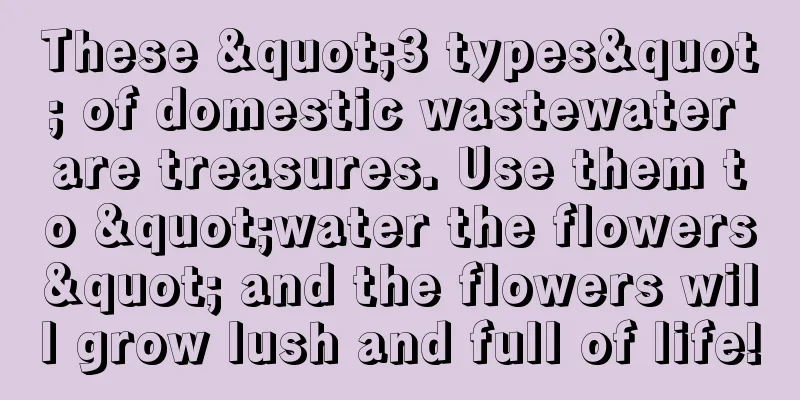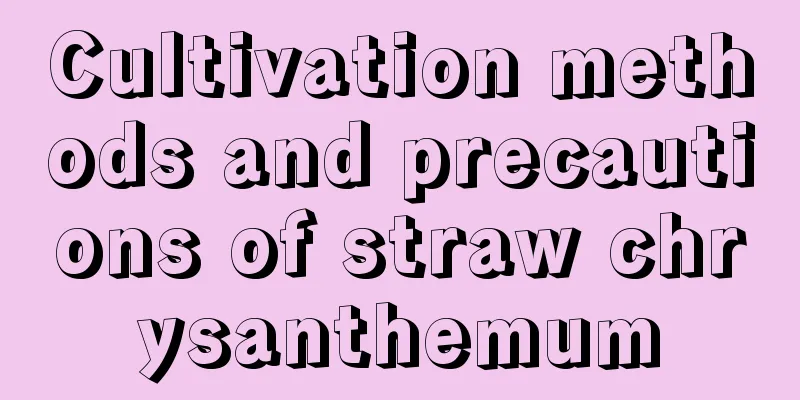These "3 types" of domestic wastewater are treasures. Use them to "water the flowers" and the flowers will grow lush and full of life!

1. Expired milkMany people have the habit of drinking milk in the morning, but sometimes if they stockpile too much milk, it may expire. At this time, don’t throw away the expired milk. We can choose to ferment it and use it to water the flowers. It can help supplement nutrition. After all, milk is rich in protein. We can pour expired milk into a container, then add water until it is 80% full for fermentation, and place it in a cool place for about half a month before it can be used. The nutrients in the fermented milk water are completely released, and watering flowers with it can increase their growth rate. 2. Rice waterRice water is a common wastewater in the home. We can get good results by using it to mop the floor and wash dishes in daily life. In fact, rice water contains more nutrients from the surface of rice. After fermentation, it can also produce nutrients containing nitrogen, which can help plants grow. If rice water is used directly to water flowers, it may burn the flower roots. We also need to add water and pour it into a container to ferment it. After fermentation, we can use it again. The nutrients in the rice water can just supplement the growth nutrients of the plants. 3. Fruit peel waterI believe no one has ever thought that leftover fruit peels can be used to water flowers. Fruit peels contain a lot of cellulose and trace substances. After being made into fruit peel water, they can just supplement the nutrients needed by plants and flowers during their growth process. To make fruit peel water, we first need to clean the fruit peel, then cut it into small pieces, add water and put it into a container for fermentation. This way the fruit peel is smaller and more conducive to the volatilization of nutrients. The fruit peel water can be used after being fermented in a cool place for about a month. Note that it is necessary to add water to dilute it when using it to avoid root rot. Wastewater may seem insignificant in our daily life, but in fact it contains a lot of nutrients. If we ferment it and use it to water the flowers, we can get good growth effects. Friends who are interested can go home and try it themselves! |
<<: Cultivation methods, growth rate and ecological value of plum blossom
Recommend
Causes and treatments for yellowing leaves of lavender
1. Insufficient light Reason: Lavender is a full-...
Reasons and solutions for water lily not blooming
The beauty of water lilies is very unique, and th...
The efficacy and function of Dutch chrysanthemum
Very high ornamental value Although the flowers o...
What should you pay attention to when raising orchids every month?
What should I pay attention to when growing orchi...
Cultivation methods and precautions of golden chrysanthemum
1. Maintenance methods 1. Substrate: Conejaculate...
Can I grow sunflowers at home?
Can I grow sunflowers at home? Sunflowers can be ...
How to make sea dianthus bloom
1. Suitable temperature and light If you want to ...
What is wheat?
What kind of crop is wheat Wheat refers to wheat,...
What to do if you water the osmanthus tree too much
The harm of excessive watering of osmanthus If th...
Three key points after flower seeds emerge
Light after seed germination After the flowers ar...
The difference between snow peas and peas
1. Differences in varieties Peas are actually a r...
How to plant and care for lilies
Lilies are famous for their diverse colors, and m...
Cultivation methods and precautions of Dieffenbachia
1. Breeding methods 1. Temperature: Dieffenbachia...
There are four taboos in growing flowers at home! Pay special attention to the last one!
Taboo 1 Flowers are also living things. Growing f...
Does mangosteen grow in the soil or on trees (Where does mangosteen grow?)
Does mangosteen grow on trees or in the soil? Man...









